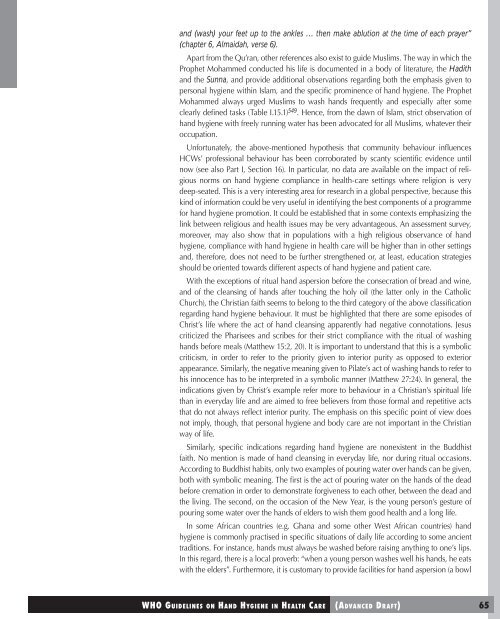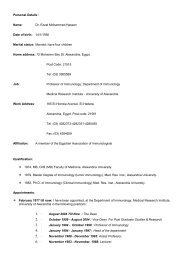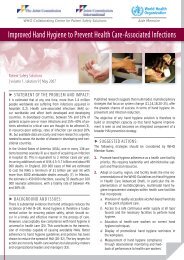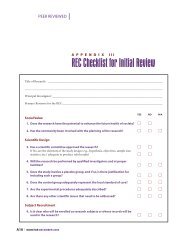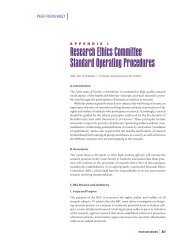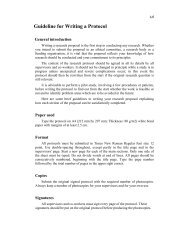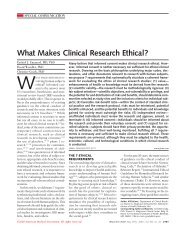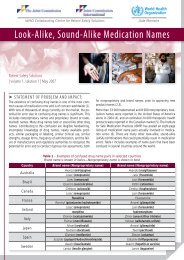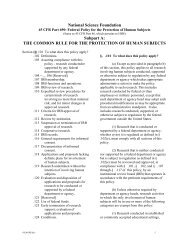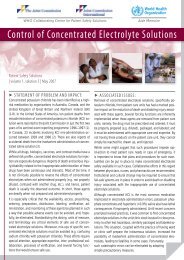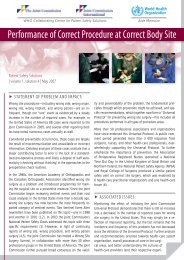Hand hygiene.pdf
Hand hygiene.pdf
Hand hygiene.pdf
Create successful ePaper yourself
Turn your PDF publications into a flip-book with our unique Google optimized e-Paper software.
and (wash) your feet up to the ankles … then make ablution at the time of each prayer”<br />
(chapter 6, Almaidah, verse 6).<br />
Apart from the Qu’ran, other references also exist to guide Muslims. The way in which the<br />
Prophet Mohammed conducted his life is documented in a body of literature, the Hadith<br />
and the Sunna, and provide additional observations regarding both the emphasis given to<br />
personal <strong>hygiene</strong> within Islam, and the specific prominence of hand <strong>hygiene</strong>. The Prophet<br />
Mohammed always urged Muslims to wash hands frequently and especially after some<br />
clearly defined tasks (Table I.15.1) 549 . Hence, from the dawn of Islam, strict observation of<br />
hand <strong>hygiene</strong> with freely running water has been advocated for all Muslims, whatever their<br />
occupation.<br />
Unfortunately, the above-mentioned hypothesis that community behaviour influences<br />
HCWs’ professional behaviour has been corroborated by scanty scientific evidence until<br />
now (see also Part I, Section 16). In particular, no data are available on the impact of religious<br />
norms on hand <strong>hygiene</strong> compliance in health-care settings where religion is very<br />
deep-seated. This is a very interesting area for research in a global perspective, because this<br />
kind of information could be very useful in identifying the best components of a programme<br />
for hand <strong>hygiene</strong> promotion. It could be established that in some contexts emphasizing the<br />
link between religious and health issues may be very advantageous. An assessment survey,<br />
moreover, may also show that in populations with a high religious observance of hand<br />
<strong>hygiene</strong>, compliance with hand <strong>hygiene</strong> in health care will be higher than in other settings<br />
and, therefore, does not need to be further strengthened or, at least, education strategies<br />
should be oriented towards different aspects of hand <strong>hygiene</strong> and patient care.<br />
With the exceptions of ritual hand aspersion before the consecration of bread and wine,<br />
and of the cleansing of hands after touching the holy oil (the latter only in the Catholic<br />
Church), the Christian faith seems to belong to the third category of the above classification<br />
regarding hand <strong>hygiene</strong> behaviour. It must be highlighted that there are some episodes of<br />
Christ’s life where the act of hand cleansing apparently had negative connotations. Jesus<br />
criticized the Pharisees and scribes for their strict compliance with the ritual of washing<br />
hands before meals (Matthew 15:2, 20). It is important to understand that this is a symbolic<br />
criticism, in order to refer to the priority given to interior purity as opposed to exterior<br />
appearance. Similarly, the negative meaning given to Pilate’s act of washing hands to refer to<br />
his innocence has to be interpreted in a symbolic manner (Matthew 27:24). In general, the<br />
indications given by Christ’s example refer more to behaviour in a Christian’s spiritual life<br />
than in everyday life and are aimed to free believers from those formal and repetitive acts<br />
that do not always reflect interior purity. The emphasis on this specific point of view does<br />
not imply, though, that personal <strong>hygiene</strong> and body care are not important in the Christian<br />
way of life.<br />
Similarly, specific indications regarding hand <strong>hygiene</strong> are nonexistent in the Buddhist<br />
faith. No mention is made of hand cleansing in everyday life, nor during ritual occasions.<br />
According to Buddhist habits, only two examples of pouring water over hands can be given,<br />
both with symbolic meaning. The first is the act of pouring water on the hands of the dead<br />
before cremation in order to demonstrate forgiveness to each other, between the dead and<br />
the living. The second, on the occasion of the New Year, is the young person’s gesture of<br />
pouring some water over the hands of elders to wish them good health and a long life.<br />
In some African countries (e.g. Ghana and some other West African countries) hand<br />
<strong>hygiene</strong> is commonly practised in specific situations of daily life according to some ancient<br />
traditions. For instance, hands must always be washed before raising anything to one’s lips.<br />
In this regard, there is a local proverb: “when a young person washes well his hands, he eats<br />
with the elders”. Furthermore, it is customary to provide facilities for hand aspersion (a bowl


